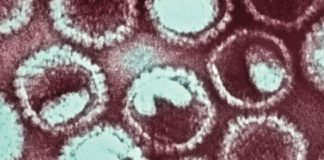
In a report today of 313 healthcare workers (HCWs) exposed to monkeypox in Colorado, none of them contracted the virus, despite few wearing the recommended personal protective equipment (PPE) or receiving postexposure prophylaxis (PEP) vaccination.
The study, by researcher with the Colorado Department of Public Health and Environment and the Centers for Disease Control and Prevention (CDC) was published in Morbidity and Mortality Weekly Report.
Just 23% wore recommended PPE
The study took place from May 1 to Jul 31, with 313 healthcare workers interacting with patients who subsequently were diagnosed as having monkeypox. Only 23% of the HCWs wore all recommended PPE during their exposures.
Of the 313 HCWs, 28% were considered to have had high- or intermediate-risk exposures and were therefore eligible to receive PEP with the Jynneos vaccine. Almost half (48%) of the workers (12% of all exposed HCW), received the vaccine.
“No HCP developed a monkeypox infection during the 21 days after exposure. These results suggest that the risk for transmission of monkeypox in health care settings is low. Infection prevention training is important in all health care settings, and these findings can guide future updates to PPE recommendations and risk classification in health care settings,” the authors said.
Most encounters between HCWs and monkeypox patients were short, with 69% lasting only 5 to 30 minutes. Only one HCW was exposed for more than 3 hours. Only seven (2%) were exposed during an aerosol-generating procedure.
Current CDC recommendations suggest HCWs wear a gown, gloves, eye protection, and an N95 (or higher-level) respirator while caring for patients who have suspected or confirmed monkeypox. Adherence to PPE recommendations was lowest in primary care and urgent care settings, and highest in sexually transmitted infection clinics and hospitals.
Among the 313 workers in the study, 38% reported wearing N95s.
Monkeypox vaccine equity program launches
Yesterday the CDC announced the launch of a new initiative called the Monkeypox Vaccine Equity Pilot Program.
The program allows local, state, and territorial health departments, as well as tribal governments and non-governmental organizations, to submit requests to access monkeypox vaccine, and it aims to reach populations that may face barriers to monkeypox vaccination.
“Up to 50,000 doses of Jynneos vaccine have been allocated for the Monkeypox Vaccine Equity Pilot program. Successful proposals will demonstrate new, innovative ways to reach populations that are most affected by monkeypox based on local or national data,” the CDC said in a press statement.
The program also aims to address vaccine inequity for Black and Latino communities. It follows the large-event pop-up program, which recently administered 11,000 vaccines at social gatherings and festivals over the past several weeks in an effort to widen the pool of vaccine recipients.
“We have a responsibility to address inequities that have been highlighted by this outbreak, and this program will help make a difference,” said CDC Director Rochelle Walensky, MD, MPH. “This outbreak is affecting members of the gay, bisexual, and other men who have sex with men community at an unequal rate, and it has disproportionately affected the Black and Hispanic communities.”
In related news, both New York and Oregon recently expanded access to monkeypox vaccines to include anyone at risk of exposure (in New York), and anyone who anticipates having or has had recent skin-to-skin contact and who knows someone who has had monkeypox, regardless of sexual preference or gender (Oregon).
CDC clarifies Tpoxx use
Also yesterday, the CDC updated treatment guidelines for the use of the antiviral Tpoxx (tecovirimat), recommending the drug be limited to people at high risk for severe disease.
“Consider severe disease when a patient has conditions such as hemorrhagic disease; large number of lesions such that they are confluent; sepsis; encephalitis; ocular or periorbital infections; or other conditions requiring hospitalization,” the CDC said.
Patients with lesions on anatomic areas that might result in serious symptoms or scarring should also be offered the medication, as should patents experiencing severe immune compromise due to uncontrolled HIV, organ transplant, or cancer therapy.
Pregnant women and children over 8 years old should also be offered treatment.
As of today US cases have climbed to 23,117.








